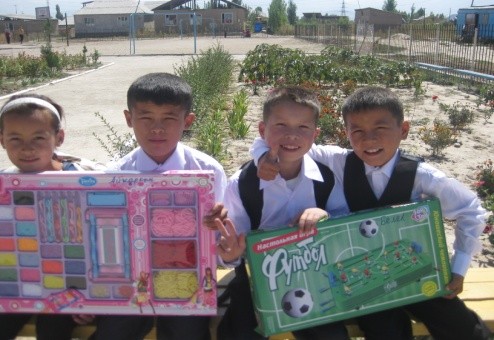
For many children in the 40 new unregistered migrant settlements outside of Bishkek, the capital of Kyrgyzstan, access to school is restricted by poverty and a lack of legal residency. Mamasabyt Raiyimberdy uulu is one of these children. At 13, he was illiterate and had never attended school because he needed to work in the bazaar to make money for his family. To add to the meager wages his mother earned by selling bananas, Mamasabyt needed to earn about $4 per day, which he did by collecting and selling used boxes.
To reach out to kids like Mamasabyt, USAID has started providing small grants to non-governmental organizations (NGOs) working in these settlement areas. One of the 10 participating NGOs, the Councils for Human Rights, organized a two-month Summer Education Camp for 21 school dropouts from six new settlements around Bishkek. These camps aimed to provide access to a friendly learning environment for children from socially vulnerable families, as well as to create a positive environment for studying, playing sports, helping each other and making friends.
Mamasabyt was eager to attend the camp after having a conversation with a social worker at the Councils for Human Rights’ Center, who explained the advantages of attending the camp. Mamasabyt would spend three hours a day at the camp and then, like other children at the camp, would go to work to assist his family. Mamasabyt was shy and reluctant to socialize at first, but he applied himself enthusiastically to learning how to read, write and draw. By the end of camp, Mamasabyt became more social and communicative with the camp’s coordinators and his peers, even taking part in a public performance of a traditional Ramadan song during the camp’s closing event. He also applied his new confidence while giving an interview to a local journalist.
As a result of USAID’s assistance to the 40 new settlements near the capital, 2,500 children were involved in 100-hour pre-school courses. A majority of them were provided with school supplies and clothes, and received assistance with registration and enrollment in school. Twenty-seven children who had dropped out of school returned back to mainstream education.
Mamasabyt achieved basic literacy, became more self-confident, improved his public speaking skills, and was motivated to pursue further school activities. Now he attends accelerated learning courses sponsored by the U.N. International Labor Organization in partnership with teachers of local special education schools and the Ministry of Education, and with technical assistance from USAID.
Today, Mamasabyt has set his sights higher and aims to receive better education and employment opportunities in the future. He dreams of one day giving his own children better learning opportunities, and he hopes to be able to improve living conditions for his family. As a result of Mamasabyt’s success in the Summer Education Camp, his parents changed their attitude toward education and understood the importance of education as the path to success.







Comment
Make a general inquiry or suggest an improvement.